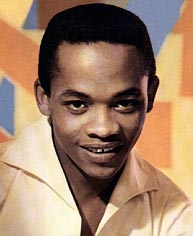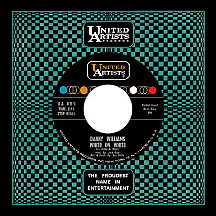DANNY WILLIAMS
White on White
While South Africa-born singer Danny Williams enjoyed his greatest success in England and was also popular for a short time in America, none of his single recordings were hits in both places; it's as though he was a different person as far as fans on either side of the Atlantic were aware. This wasn't necessarily a problem and while his image became obscured within a few years, his ultra-romantic vocal expertise served him well in the meantime. He topped the U.K. chart in December 1961 with "Moon River," which had already been a hit in the U.S. for both its composer, Henry Mancini, and Jerry Butler. As 1962 began with Danny still heading the chart, Iowa-born Andy Williams (no relation; indeed, the two were raised nearly halfway 'round the world from one another), recorded what was soon to be a very famous version of the song (with an arrangement much closer to Danny's than the others). Nevertheless, a great many Europeans prefer the younger Williams' take on the song. Even Andy expressed admiration for the then-19-year-old's skillful rendition.
Growing up in Port Elizabeth on the southern tip of the African continent, under the apartheid system of racial segregation, was challenging for Danny, whose father had died fighting in Korea. He was raised since adolescence by his grandmother and ultimately got a few lucky breaks. In 1956, at age 14, he won a talent competition that led to his joining the all-black Golden City Dixies, a large band that implemented a wide selection of musical styles including jazz, pop, folk, spiritual songs and African tribal melodies. Initially the show toured within the borders of South Africa, but demand grew over the course of several years and the act, which numbered 20 at the time, was allowed to perform in Europe. During a 1959 tour stop in Sweden, nine of the group's members defected and remained in Stockholm. When the show reached London, although Danny wasn't yet 18, record producer Norman Newell of His Master's Voice (or HMV), the main U.K. label of the Gramophone Company (affiliated with RCA Victor in the U.S.), convinced him to stay and signed him to a recording contract.
"Tall a Tree," penned by Newell and Mischa Spoliansky (a Russian immigrant who from the late '30s through '50s had been highly successful writing scores for British movies), was Danny's first single in the spring of '59. It wasn't a hit, but favorable comparisons to U.S. superstar Johnny Mathis helped spread the word and during the summer and fall he appeared on more than a dozen episodes of BBC-TV's Drumbeat, a short-lived pop music series. Three further singles in '59 and '60 failed to catch on before "We Will Never Be This Young Again," a lush ballad written specifically for Danny by Lionel Bart (creator of the West End stage musical Oliver!) and chart-topping pianist-bandleader Russ Conway, had a brief chart run in May and June of '61. This was followed by "The Miracle of You," a minor summer hit. These early efforts were produced by Newell and recorded at Abbey Road Studios in the St. John's Wood district of Westminster, London; Geoff Love's orchestra and stalwart session group The Rita Williams Singers (again, no relation) supplied the appropriate backing.

Breakfast at Tiffany's, the hot box office film based on a book by Truman Capote and starring Audrey Hepburn, featured Mancini and lyricist Johnny Mercer's soon-to-be Oscar-winning song "Moon River." Besides the abovementioned hits, Miss Hepburn can be credited for the original version due to her cinematic minute-and-a-half fire escape performance. Danny made his own film debut a few months later, singing "Who Can Say?" in Play it Cool, a rocking teen musical that also featured Brit hitmakers Billy Fury and Helen Shapiro as well as U.S. teen idol Bobby Vee. Another hit came with the Mathisesque "Jeannie," then Danny reappeared in the top ten with Brooklyn-based pop composers Sid Tepper and Roy C. Bennett's "The Wonderful World of the Young," which Andy Williams had recorded first - instead of the other way around, as was the case with "Moon River."
Hit singles were already getting harder to come by in February 1963 when Danny embarked on a monthlong tour headlined by Shapiro, riding high with four major U.K. hits; The Beatles, who'd just released their second single, "Please Please Me," opened the show. At first the girls screamed for Danny, but by the time the tour ended March 3, there was chaos among the concertgoers...and it had nothing to do with him. United Artists had licensed his recordings for release in the U.S. and "More," from the score of the movie Mondo Cane, received a little airplay on stations around the country, though an instrumental by Kai Winding and vocal version by Vic Dana became much bigger hits that summer. Still, this hint of interest was enough for HMV to send him to the U.S. that fall, where he made some recordings with producer Jack Gold and musical arranger Don Costa. His only major stateside hit resulted.
Struggling songwriters Lor Crane and Bernice Ross hit pay dirt when Danny waxed their sad wedding song "White on White" ('...lace on satin...my little angel is getting married today'...but not to him!), which began showing up on record surveys in February 1964, just as his former tourmates John, Paul, George and Ringo were taking up more spots near the top of the U.S. charts than anyone would have bet money on. Danny's sweetly bleak, radio-friendly song made its climb with Beatles 45s all around it, though not to the degree that it kept him from the top ten, where he spent two weeks in May. Another Crane-Ross tune, "A Little Toy Balloon," managed only smatterings of airplay that summer, while the older "More" reappeared on a handful of radio playlists.
The trip to America had been productive, coming at a time when Danny was no longer hitting the U.K. charts. He sang the title theme for the 1965 movie Masquerade starring Cliff Robertson and in the spring of 1966 made the knee-jerk move almost every artist does, though sooner than most: "Blue on White," also penned by Lor and Ross, closely mimicked the "White on White" formula with a slight variation (he got the girl, then she left him); the single stiffed. Nightclub work remained steady and he regularly guested on TV variety shows in Britain, often showing up on ITV's Thank Your Lucky Stars. Then HMV dropped him in '67 and opportunities to make records came infrequently. Bankruptcy left him in a desperate situation for much of the 1970s; "Dancin' Easy," a top 30 hit in Britain in 1977, offered a temporary reprieve. He'd always claimed his idol was Nat "King" Cole and got the chance to prove it by touring in a Cole tribute show during the '90s. At the time of his death in 2005, Danny Williams had been married three times, illustrating the point that life doesn't necessarily imitate song lyrics.


